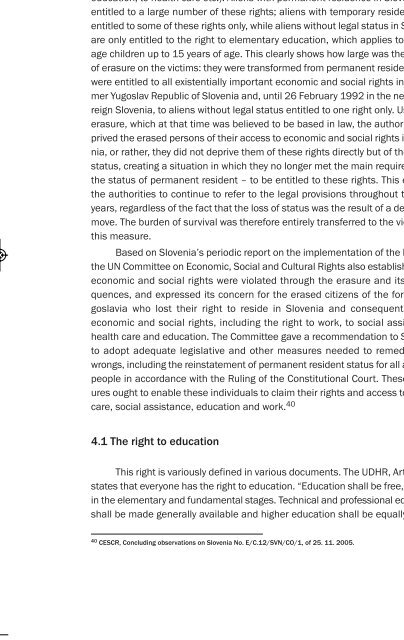The Scars of the Erasure_web
The Scars of the Erasure_web
The Scars of the Erasure_web
- No tags were found...
Create successful ePaper yourself
Turn your PDF publications into a flip-book with our unique Google optimized e-Paper software.
<strong>Erasure</strong>_4a 10.1.11 20:29 Page 123THE ERASURE AS A VIOLATION OF LEGALLY PROTECTED HUMAN RIGHTS123As was clarified above, according to Slovenian legislation pertaining to economicand social rights, <strong>the</strong> number <strong>of</strong> rights granted depends on <strong>the</strong> person’slegal status. Only Slovenian citizens are entitled to <strong>the</strong> full range <strong>of</strong> economicand social rights (<strong>the</strong> right to work, <strong>the</strong> right to social assistance, <strong>the</strong> right toedu cation, to health care etc.). Aliens with permanent residence in Slovenia areentitled to a large number <strong>of</strong> <strong>the</strong>se rights; aliens with temporary residence areentitled to some <strong>of</strong> <strong>the</strong>se rights only, while aliens without legal status in Sloveniaare only entitled to <strong>the</strong> right to elementary education, which applies to schoolagechildren up to 15 years <strong>of</strong> age. This clearly shows how large was <strong>the</strong> impact<strong>of</strong> erasure on <strong>the</strong> victims: <strong>the</strong>y were transformed from permanent residents whowere entitled to all existentially important economic and social rights in <strong>the</strong> formerYugoslav Republic <strong>of</strong> Slovenia and, until 26 February 1992 in <strong>the</strong> new, sove -reign Slovenia, to aliens without legal status entitled to one right only. Using <strong>the</strong>erasure, which at that time was believed to be based in law, <strong>the</strong> authorities deprived<strong>the</strong> erased persons <strong>of</strong> <strong>the</strong>ir access to economic and social rights in Slovenia,or ra<strong>the</strong>r, <strong>the</strong>y did not deprive <strong>the</strong>m <strong>of</strong> <strong>the</strong>se rights directly but <strong>of</strong> <strong>the</strong>ir legalstatus, creating a situation in which <strong>the</strong>y no longer met <strong>the</strong> main requirement –<strong>the</strong> status <strong>of</strong> permanent resident – to be entitled to <strong>the</strong>se rights. This enabled<strong>the</strong> authorities to continue to refer to <strong>the</strong> legal provisions throughout <strong>the</strong> pastyears, regardless <strong>of</strong> <strong>the</strong> fact that <strong>the</strong> loss <strong>of</strong> status was <strong>the</strong> result <strong>of</strong> a deliberatemove. <strong>The</strong> burden <strong>of</strong> survival was <strong>the</strong>refore entirely transferred to <strong>the</strong> victims <strong>of</strong>this measure.Based on Slovenia’s periodic report on <strong>the</strong> implementation <strong>of</strong> <strong>the</strong> ICESCR,<strong>the</strong> UN Committee on Economic, Social and Cultural Rights also established thateconomic and social rights were violated through <strong>the</strong> erasure and its consequences,and expressed its concern for <strong>the</strong> erased citizens <strong>of</strong> <strong>the</strong> former Yugoslaviawho lost <strong>the</strong>ir right to reside in Slovenia and consequently, <strong>the</strong>ireconomic and social rights, including <strong>the</strong> right to work, to social assistance,health care and education. <strong>The</strong> Committee gave a recommendation to Sloveniato adopt adequate legislative and o<strong>the</strong>r measures needed to remedy <strong>the</strong>sewrongs, including <strong>the</strong> reinstatement <strong>of</strong> permanent resident status for all affectedpeople in accordance with <strong>the</strong> Ruling <strong>of</strong> <strong>the</strong> Constitutional Court. <strong>The</strong>se measuresought to enable <strong>the</strong>se individuals to claim <strong>the</strong>ir rights and access to healthcare, social assistance, education and work. 404.1 <strong>The</strong> right to educationThis right is variously defined in various documents. <strong>The</strong> UDHR, Article 26,states that everyone has <strong>the</strong> right to education. “Education shall be free, at leastin <strong>the</strong> elementary and fundamental stages. Technical and pr<strong>of</strong>essional educationshall be made generally available and higher education shall be equally acces-40 CESCR, Concluding observations on Slovenia No. E/C.12/SVN/CO/1, <strong>of</strong> 25. 11. 2005.


